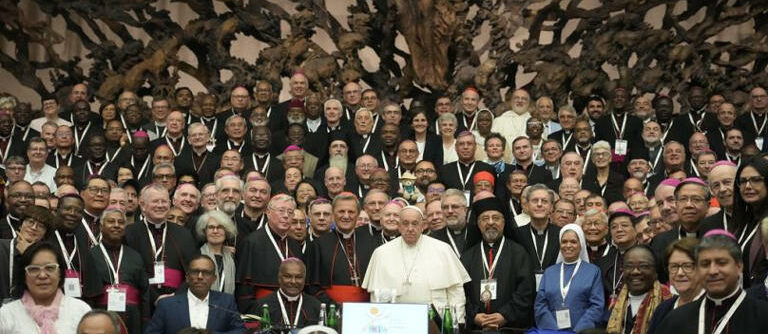Perhaps the only reason that a true Catholic with a good will and a functioning intellect would fear coming to the same conclusion on the papacy as Archbishop Viganó did would be the indefectibility of the Catholic Church. Fr. John Hardon SJ explains that indefectibility essentially promises that the Catholic Church “will always remain the institution of salvation, founded by Christ. This affirms that the Church is essentially unchangeable in her teaching, her constitution, and her liturgy. It does not exclude modifications that do not affect her substance, nor does it exclude the decay of individual local churches or even whole dioceses.”
But could that decay include the Pope? Of course, it could not include a valid Pope. What then is going on in Rome? Mr. Matthew McCusker at Lifesite News points to several pre-Conciliar theologians who show that indefectibility does not mean the same thing as most traditional Catholic theologians today believe. We will consider just a few of the priests and bishops he quotes.
Firstly, he quotes Fr. John McLaughlin, a priest who wrote in the early twentieth century:
“We concede, moreover, that there may have been occasions in the past (and such intervals may occur in the future) when, through the opposition of anti-Popes and a variety of untoward circumstances, it was difficult for individuals for the moment to tell where the right source of authoritative teaching was to be found. This, however, does not change the state of the case in the least; the one true Church was in the world somewhere all the same, and in full possession of all her essential prerogatives, although, for the passing hour – from transient causes – she may not have been easily discernible to the less observant. Just as there have been times when some dense fog or mist made it impossible for the ordinary observer to tell the exact spot the sun occupied in the sky, although everybody knew that he was there somewhere; knew, too, that he would in due course make the exact location of his presence visible to all, and that, as soon as the mist lifted, his rays would come straight to the earth again, and every one would see that he was identically the same luminous orb that had shone before.” 1
Secondly, he quotes the world-renowned Dom Guéranger:
“A Decius may succeed in causing a four years’ vacancy in the See of Rome; anti-popes may arise, supported by popular favour, or upheld by the policy of Emperors; a long schism may render it difficult to know the real Pontiff amidst the several who claim it: the Holy Spirit will allow the trial to have its course, and, whilst it lasts, will keep up the faith of his children; the day will come when he will declare the lawful Pastor of the flock, and the whole Church will enthusiastically acknowledge him as such.” 2
Thirdly, he quotes Fr. Sylvester Berry, an American theologian, who wrote “Apocalypse of St. John” in 1921:
“It is a matter of history that the most disastrous periods for the Church were times when the Papal throne was vacant, or when anti-popes contended with the legitimate head of the Church. Thus also shall it be in those evil days to come. The Church deprived of her chief pastor must seek sanctuary in solitude there to be guided by God Himself during those trying days… Antichrist and his prophet will introduce ceremonies to imitate the Sacraments of the Church. In fact there will be a complete organization — a church of Satan set up in opposition to the Church of Christ. Satan will assume the part of God the Father; Antichrist will be honored as Savior, and his prophet will usurp the role of Pope.” 3
Mr. Matthew McCusker at LSN then wisely summarizes his above authors in application to what he believes we are currently experiencing in 2024: “It is crucial to note however, that while we do not have a guarantee that Our Lord will not permit terrible trials to befall the Church we do ‘know with absolute certainty that He will fulfil His promises; not allow anything to occur at variance with them.’ That is why while an extended vacancy is possible, however ‘terrible and distressing’ it may be, a ‘heretical pope’ is not [possible], because it is contrary to the nature of the Church that a public heretic should be a member of her visible body, and even more so that one should be her Visible Head, and Supreme Teacher of the Catholic faith.”
